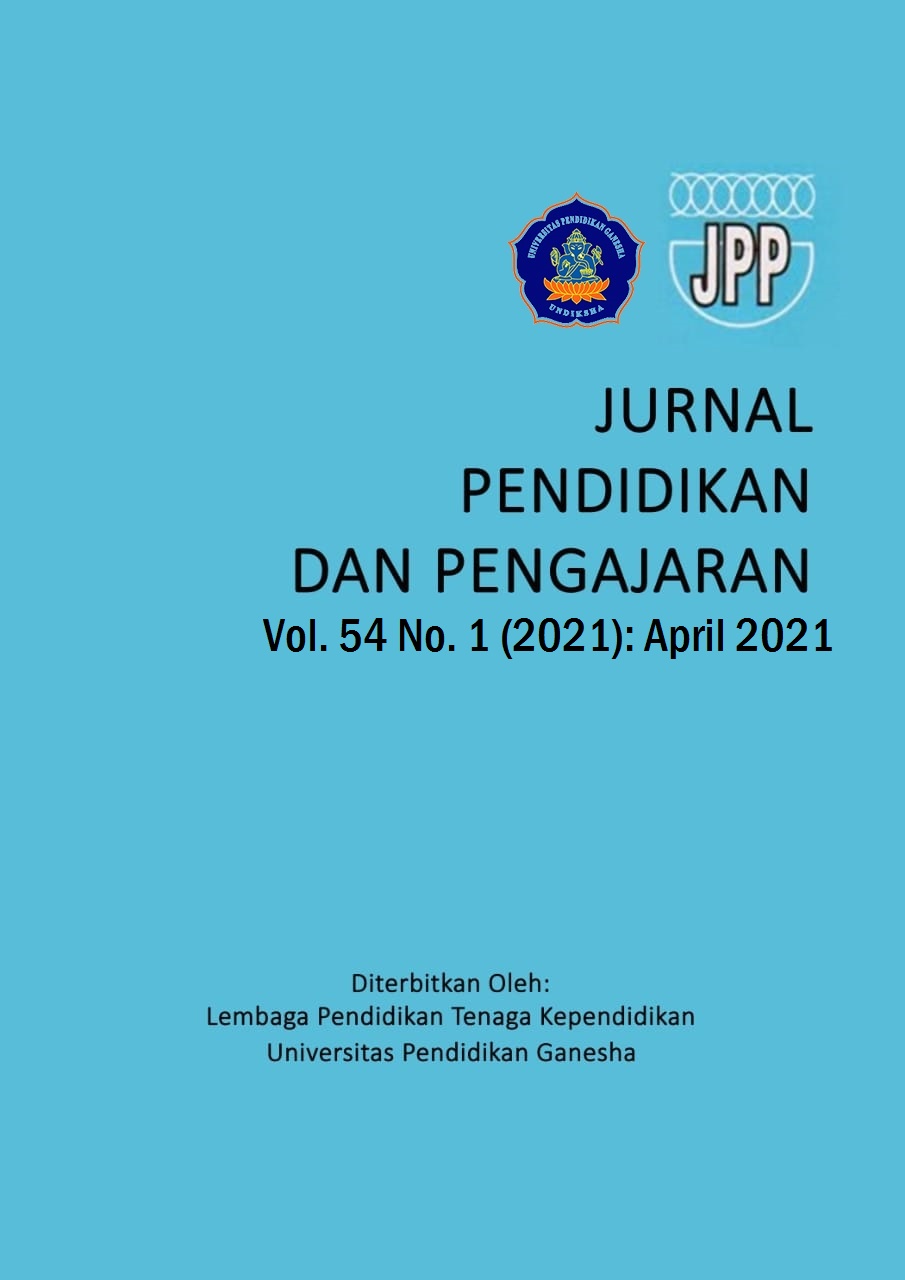Teacher's Illocutionary Acts in Online Learning Interactions
DOI:
https://doi.org/10.23887/jpp.v54i1.33061Keywords:
Speech Acts, Illocution, Online LearningAbstract
Speech acts happen within the communication between teachers and students in online learning interactions. This study aims to describe the forms of illocutionary acts and representations of an Indonesian teacher's power strategies in online learning interactions through WhatsApp and Google Classroom. A descriptive qualitative was used to garner written conversations between the teacher and the students. This study involves an Indonesian language teacher and students, totaling 36 students. The data was gathered from written conversational speeches conveyed by the teacher and students through WhatsApp and Google Classroom during online learning. The data was analyzed using Miles and Huberman's model, including data collection, data reduction (data presentation), drawing temporary conclusion and verification, and conclusion and recommendation. The study reveals several types of illocutionary acts, such as assertive, directive, expressive and commissive – while no types of illocutionary acts are found. The teacher's representation of the power strategy in online learning interactions includes speech control, threatening, and being angry with insinuation.
References
Asrianti, A. (2019). Representasi kekuasaan dalam wacana kelas di Sekolah Menengah Pertama. RETORIKA: Jurnal Bahasa, Sastra, Dan Pengajarannya, 12(1), 14–24. https://doi.org/10.26858/retorika.v12i1.7384.
Daheri, M., Juliana, Deriwanto, & Amda, A. D. (2020). Efektifitas WhatsApp sebagai Media Belajar Daring. Basicedu, 4(4), 775–783. https://doi.org/10.31004/basicedu.v4i4.445.
Ekawati, M. (2017). Kesantunan Semu pada Tindak Tutur Ekspresif Marah dalam Bahasa Indonesia. Adabiyyāt: Jurnal Bahasa Dan Sastra, 1(1), 1–22. https://doi.org/10.14421/ajbs.2017.01101.
Enriquez, M. A. S. (2014). Students' Perceptions on the Effectiveness of the Use of Edmodo as a Supplementary Tool for Learning. DLSU Research Congress. https://doi.org/10.1017/CBO9781107415324.004.
Faelani, N., & Setyowati, E. (2018). Tindak Tutur dalam Pembelajaran Bahasa Indonesia Peserta didik Kelas VII SMP Negeri 2 Pacitan Tahun Pelajaran 2016/2017. Prakerta (Jurnal Penelitian Bahasa, Sastra Dan Pengajaran Bahasa Indonesia), 1(1), 54–61. https://ejournal.stkippacitan.ac.id/index.php/prakerta/article/view/109.
Gikas, J., & Grant, M. M. (2013). Mobile computing devices in higher education: Student perspectives on learning with cellphones, smartphones & social media. Internet and Higher Education, 19, 18–26. https://doi.org/10.1016/j.iheduc.2013.06.002.
Handayanto, R. T., & Herlawati, H. (2020). Efektifitas Pembatasan Sosial Berskala Besar (PSBB) di Kota Bekasi Dalam Mengatasi COVID-19 dengan Model Susceptible-Infected-Recovered (SIR). Jurnal Kajian Ilmiah, 20(2), 119–124. https://doi.org/10.31599/jki.v20i2.119.
Hasanah, S. U., & Widodo, M. (2017). Tindak Tutur Guru Dan Siswa SMP pada Pembelajaran Bahasa Indonesia Dan Implikasinya. J-SIMBOL (Bahasa Dan Sastra Indonesia), 5(1). https://core.ac.uk/download/pdf/293165307.pdf.
Iftakhar, S. (2016). Google classroom: what works and how? Journal of Education and Social Sciences, 3(2), 12–18. http://jesoc.com/wp-content/uploads/2016/03/KC3_35.pdf.
Ismail, A. (2018). Pilihan Kosakata Nilai Eksperiensial Kosakata Kekuasaan Guru Perempuan Bugis dalam Pembelajaran Bahasa Indonesia. Retorika: Jurnal Bahasa, Sastra, Dan Pengajarannya, 11(2), 119–128. https://doi.org/10.26858/retorika.v11i2.6367.
McGrew, S., Breakstone, J., Ortega, T., Smith, M., & Wineburg, S. (2018). Can students evaluate online sources? Learning from assessments of civic online reasoning. Theory & Research in Social Education, 46(2), 165–193. https://doi.org/10.1080/00933104.2017.1416320.
Munawir, M. (2018). Tindak Tutur Guru dalam Pembelajaran Bahasa Indonesia Di Kelas XII SMK Negeri 1 Narmada. Jurnal Ilmiah Telaah, 3(1), 25–32. https://doi.org/10.31764/telaah.v3i1.303.
Puspitasari, D. (2020). Tindak Tutur Guru Dalam Pembelajaran Bahasa Indonesia Pada Kelas VII MTsN 4 Palu. Jurnal Bahasa Dan Sastra, 5(3). https://core.ac.uk/download/pdf/289713905.pdf.
Sadikin, A., & Hamidah, A. (2020). Pembelajaran Daring di Tengah Wabah Covid-19:(Online Learning in the Middle of the Covid-19 Pandemic). Biodik, 6(2), 214–224. https://doi.org/10.22437/bio.v6i2.9759.
Saifudin, A. (2019). Teori Tindak Tutur dalam Studi Linguistik Pragmatik. Lite: Jurnal Bahasa, Sastra, Dan Budaya, 15(1), 1–16. https://doi.org/10.33633/lite.v15i1.2382.
Sicat, A. (2015). Enhancing College Students' Proficiency in Business Writing Via Schoology. International Journal of Education and Research, 3(1), 159–178. http://www.ijern.com/journal/2015/January-2015/14.pdf.
So, S. (2016). Mobile instant messaging support for teaching and learning in higher. The Internet and Higher Education, 31, 32–42. https://doi.org/10.1016/j.iheduc.2016.06.001.
Susmita, N. (2019). Tindak Tutur Guru dan Siswa dalam Pembelajaran Bahasa Indonesia. JPGI (Jurnal Penelitian Guru Indonesia), 4(1), 25–30. https://doi.org/10.29210/02353jpgi0005.
Syarifudin, A. S. (2020). Implementasi Pembelajaran Daring untuk Meningkatkan Mutu Pendidikan Sebagai Dampak Diterapkannya Social Distancing. Jurnal Pendidikan Bahasa Dan Sastra Indonesia Metalingua, 5(1), 31–34. https://doi.org/10.21107/metalingua.v5i1.7072.
Syauqi, K., Munadi, S., & Triyono, M. B. (2020). Students' perceptions toward vocational education on online learning during the COVID-19 pandemic. International Journal of Evaluation and Research in Education, 9(4), 881–886. https://doi.org/10.11591/ijere.v9i4.20766.
Tarmini, w. (2016). Representasi Kekuasaan pada Tindak Tutur Dosen di Lingkungan FKIP Universitas Lampung: Sebuah Kajian Pragmatik. Prosiding Konferensi Internasional IKADBUDI VI. http://repository.lppm.unila.ac.id/id/eprint/3057.
Triana, P. M., & Zamzani, Z. (2019). Representasi Kekuasaan pada Bentuk Gramatikal Tindak Tutur Guru dalam Pembelajaran Bahasa Indonesia. Lensa: Kajian Kebahasaan, Kesusastraan, Dan Budaya, 9(1), 77–89. https://doi.org/10.26714/lensa.9.1.2019.77-89.
Wijayanengtias, M., & Claretta, D. (2020). Student Perceptions of Online Learning During the Covid-19 Pandemic. Kanal: Jurnal Ilmu Komunikasi, 9(1), 16–21. https://doi.org/10.21070/kanal.v9i1.685.
Yanto, J. A., Rusminto, N. E., & Tarmini, W. (2013). Representasi Kekuasaan Pada Tindak Tutur Guru dalam Pembelajaran Bahasa Indonesia. J-SIMBOL (Bahasa Dan Sastra Indonesia), 1(2). https://core.ac.uk/download/pdf/293165348.pdf.
Downloads
Published
How to Cite
Issue
Section
License
Authors who publish with Jurnal Pendidikan dan Pengajaran agree to the following terms:- Authors retain copyright and grant the journal the right of first publication with the work simultaneously licensed under a Creative Commons Attribution License (CC BY-SA 4.0) that allows others to share the work with an acknowledgment of the work's authorship and initial publication in this journal
- Authors are able to enter into separate, additional contractual arrangements for the non-exclusive distribution of the journal's published version of the work (e.g., post it to an institutional repository or publish it in a book), with an acknowledgment of its initial publication in this journal.
- Authors are permitted and encouraged to post their work online (e.g., in institutional repositories or on their website) prior to and during the submission process, as it can lead to productive exchanges, as well as earlier and greater citation of published work. (See The Effect of Open Access)





